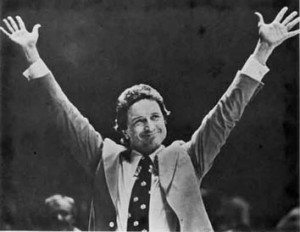 As a new feature, I’d like to use this space occasionally to remember coaches who, for one reason or another, made an indelible mark on the game. The degree of fame will vary from coach to coach and today we’ll lead with Al McGuire, whose level of fame was exceedingly high as a coach, TV analyst and businessman.
As a new feature, I’d like to use this space occasionally to remember coaches who, for one reason or another, made an indelible mark on the game. The degree of fame will vary from coach to coach and today we’ll lead with Al McGuire, whose level of fame was exceedingly high as a coach, TV analyst and businessman.
I won’t ever spend a lot of time on biographical data because you can read that anywhere if you’re so inclined. But, in Al McGuire’s case, at Marquette he won a National Championship in 1977 beating North Carolina and an NIT championship in 1970 when that was a tougher task than in the modern era. His record for the then Warriors (not Golden Eagles) was 295-80 and he had a 28-1 record in 1971.
Amazingly, the 1977 championship game was the last game he ever coached as he retired at the age of 48 to take an executive position with Medalist Industries. Less than a year later, he resigned from that position and later embarked on the color commentary career with which more readers will identify than his coaching career. Working with Dick Enberg and Billy Packer, McGuire carved out a similar niche in that industry as the colorful individualist he was in his coaching career.
What then are the takeaways from McGuire’s coaching career? Just yesterday, we discussed how important it is for coaches to possess difference-making assets. We called them “somethings” and Coach McGuire possessed many. First and foremost, he was a great recruiter. On the surface that might not matter to a lot of high school coaches on this site. But, just maybe recruiting skills should be recognized because they are really nothing more than communicating and selling- and we all are in that business to one degree or another. I’m told Coach McGuire was great with the Moms.
As for his system, it was pre-shot clock and Coach ran a lot of action but inevitably it ended with great spacing in an isolation or a screen/roll, getting defenders on proverbial “islands”. Defensively, he was just as tempo oriented and his teams made you grind to get a good look. A five point Marquette lead was the equivalent of a ten point lead in other hands. He was a great game coach and used his timeouts particularly well in an era when there fewer timeouts available. If you had to prepare to play Coach McGuire’s Marquette team, you were facing an extremely well fundamentally sound system and yet it was an unusual and very tough prep.
Coach McGuire was also perhaps the first great head coach delegator. Hank Raymonds, who succeeded him and Rick Majerus were fine assistant coaches in their own rights at the time and later distinguished head coaches but during their years together, they were the nuts and bolts components and Coach McGuire was all about “prime time”. He wanted two hours of practice, game day and closing on a great recruit. He loved all three components and it was reflected in his team’s performances.
As much as anything else, however, it was Coach Al McGuire’s leadership ability that separated him from most. After all, he played at St. John’s, had an NBA career himself and took a Division II head coaching position at tiny Belmont Abbey in North Carolina, where he perfected his craft. He also “practiced” recruiting New York City for Belmont Abbey, which later paid great dividends at Marquette. A native New Yorker himself, he was long on street savvy, confidence, poise and personality. In short, he had a magnetic persona and opposing coaches also had to compete against that element.
If you’re old enough to have watched Marquette basketball under Coach Al McGuire and recognized and appreciated his genius (I’m guessing age 50 and up or thereabouts), I might be preaching to the choir. If, on the other hand, you missed that era first hand, it might be valuable to further research the life and work of a truly great coach.


